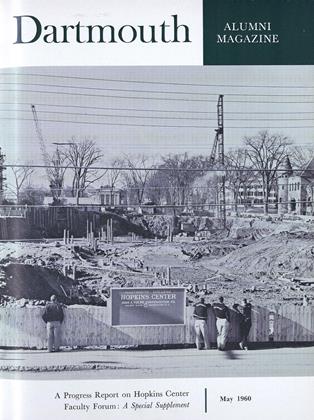By Gene Markey '18. New York: David McKay, 1960. 311 pp. $4-95-
It is a pleasure, to welcome another historical novel from Gene Markey's pen, written with the usual professional skill and based on sound research. It tells the story of the movement in the spring and early summer of 1794 of a large family group from the Piedmont region of Virginia to the early metropolis of the West in Lexington, Kentucky. General Jared Kensal and his men led off on horse. The long train of Conestoga wagons carried food and furniture and supplies. The London coach-and-four carried the lady of the house and some of the children; a few soldiers, a few dogs, and a large group of slaves and cattle completed the patriarchal procession.
The way was almost an impossible one with no roads beyond Winchester, and swift rivers to cross and steep Appalachian ridges to surmount. At Ashby's Gap, to get over the Blue Ridge into the Shenandoah Valley, some sixty oxen had been contracted for. Each wagon was pulled up the steep slopes by eight yoke of oxen, and pushed as well by sweating slaves, then eased down on the other side. At the more difficult Alleghenies further west no oxen had appeared, and the wagons were hauled over yard-by-yard by the incredible efforts of the slave gang. And then at long last when they reached the Ohio River at Parkersburg, at the mouth of the Little Kanawha, and could anticipate an easier mode of travel by means of specially constructed flatboats, there awaited them the ever-present threat of the aggressive Indians on the Ohio shore. One flatboat, grounded on a sand bar, experienced the not-unusual wild attack from a group of Delawares.
Textbooks in the westward movement describe all these adventures in prosaic terms, but in these pages the work and the worries and the privations take on real lite. The reader senses, also, the tug of that early West and experiences the high hopes it stirred in many a human heart. No story of "that tar paradise" in Kentucky would be complete without Daniel Boone, and sure enough he shows up when the flotilla lands at Maysville. On the periphery of events the reader encounters Mad Anthony Wayne and Lord Dorchester, General Knox and President Washington, and is impressed with the tension which exists in the Ohio country in this period just before Wayne's victory at Fallen Timbers.
There are enough threads of human affection and conflict to amuse and intrigue and one major theme of love which ends on a hopeful note. Although some of the main characters are not what we think of as typical frontier folk, such figures as Ab Cation fill this bill, and the author has included lively conversation at an earthy level which is both convincing and enlightening.
That Far Paradise is excellent reading, all the while it provides a stirring glimpse of the westward movement in that time when Kentucky was the newborn state, the Ohio country still in large part Indian domain, and the West a new world "where the promises can't fail."
 View Full Issue
View Full Issue
More From This Issue
-
 Feature
FeatureThe Poetry of History: William Faulkner's Image of the South
May 1960 By HENRY L. TERRIE JR., -
 Feature
Feature"What We Are After"
May 1960 By EDWARD T. CHAMBERLAIN JR. -
 Feature
FeatureNATO in Trouble
May 1960 By H. WENTWORTH ELDREDGE '31, -
 Feature
FeatureThe Canadian Arctic Islands: North America's Last Petroleum Province?
May 1960 By ANDREW H. McNAIR, -
 Feature
FeatureHOPKINS CENTER: A Progress Report
May 1960 -
 Feature
FeatureTheatre Notables to Advise Center
May 1960
ALLEN R. FOLEY '20
-
 Books
BooksFRONTIER OHIO
May 1936 By Allen R. Foley '20 -
 Books
BooksREVIEWS OF RECENT PUBLICATIONS BY ALUMNI AND FACULTY TORY TAVERN
August 1942 By Allen R. Foley '20 -
 Books
BooksSINCE 1900 (Rev. Ed.)
October 1952 By Allen R. Foley '20 -
 Article
ArticleHANOVER'S DORMITORY TOWN
May 1962 By ALLEN R. FOLEY '20 -
 Article
ArticleHANOVER UNDER COVER
FEBRUARY 1964 By ALLEN R. FOLEY '20 -
 Article
ArticleON RETIREMENT
JUNE 1964 By ALLEN R. FOLEY '20
Books
-
 Books
BooksOUT OF REVOLUTION.
December 1938 By Alexander Meiklejohn. -
 Books
BooksALASKA SOURDOUGH:
February 1951 By CLIFFORD L. JORDAN '45 -
 Books
BooksA FURTHER RANGE
October 1936 By Francis Lane Childs '06 -
 Books
BooksSeeing Tilley Plain
OCT. 1977 By R.H.R. -
 Books
BooksHURRAY! I WENT TO THE DENTIST TODAY!
MARCH 1970 By RICHARD L. SMALL, D.M.D. -
 Books
BooksUp From the Nickelodeon
NOVEMBER 1981 By Robert H. Ross '38

